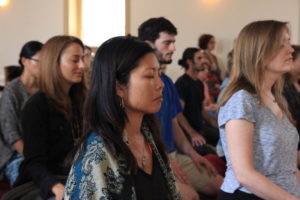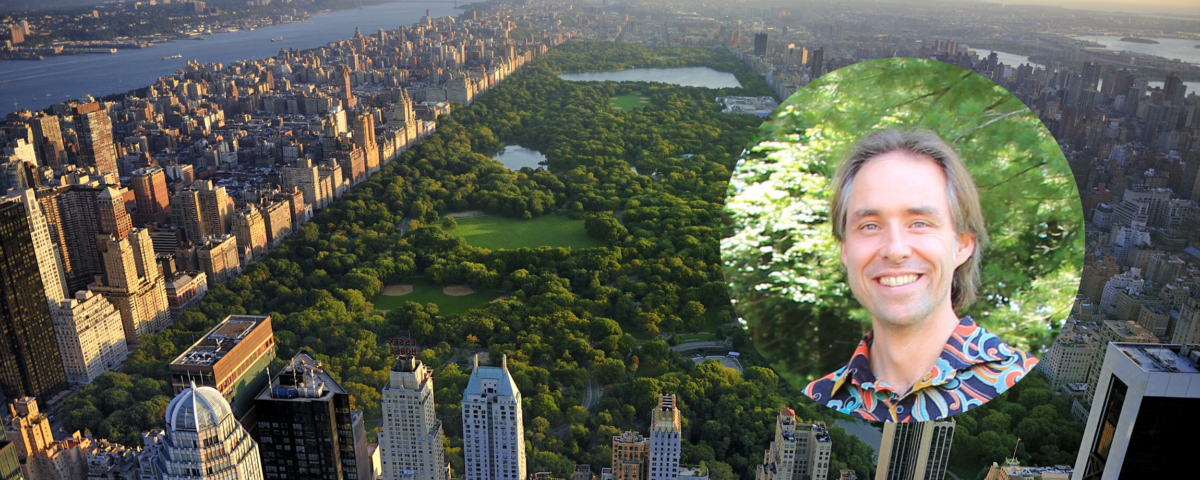IMS teacher Bart van Melik has been teaching meditation since 2009, with a special focus on serving diverse communities. He is based in New York City and is one of several IMS teachers who offer the dharma in the new Urban Retreat format. Here, in his own words, Bart tells us about his personal journey as a meditation student and teacher, and shares some thoughts on the benefits of an IMS Urban Retreat.
Bart, how did you discover insight meditation?
From a young age I have been interested in how the mind works. In graduate school I studied the psychology of culture and religion but it was not until I encountered insight meditation in Thailand that it totally clicked for me. Soon after, IMS co-founder Joseph Goldstein and teacher Carol Wilson came to my home country – The Netherlands – and offered a 10-day retreat. They taught a wide variety of mindfulness practices and this opened a sense of personal agency in my practice. Afterwards, Joseph encouraged me to consider a longer retreat and when I moved to the U.S., I signed up for my first six-week retreat at IMS in Barre, MA.
When did you transition from student to mindfulness teacher?
Near the completion of my retreat at IMS in 2008, I had a deep inner knowing that the practice was not only for myself. During a student interview with Joseph I expressed my interest in sharing the practices with youth. Joseph generously connected me with Lineage Project, a New York City based nonprofit organization that delivers mindfulness training to young people navigating incarceration, homelessness, school suspension, and academic challenges. I became a volunteer and was mentored by senior teachers who had experience working with people in very challenging life circumstances.
Soon, I was offering mindfulness practices in two juvenile detention centers in the South Bronx. I started working in homeless shelters for families. I taught kids who were suspended from their high schools and middle schools. And I offered teachings at residential treatment centers.
It was good that I started as a volunteer and received trauma sensitive training. These early experiences gave me the opportunity to reflect on power, privilege, race, and social location; even my own immigrant status. I’ve been shaped by that work. Later I became involved in the Spirit Rock Community Dharma Leader (CDL) program and began teaching adults through the New York Insight Meditation Center.

Does your experience working with young people influence your approach when teaching adult populations?
Yes. Here is an example. In one school classroom, I often repeated the phrase, ‘You are never too late for the present moment.’ A few days later, some of the students arrived late to class and insisted that they did not need a tardy pass. I replied, ‘Why not? You are late.’ They happily reminded me that we are never too late for the present moment.
I use this kind of humorous and inspirational reminder when teaching people who may be hesitant or less motivated to learn mindfulness, whether they are young people facing difficult life situations, veterans in the psychiatric unit of a VA hospital, or a boardroom full of bankers. The beauty of mindfulness techniques is that they cross almost every social barrier. My message to everyone is that these practices can emancipate us from the habits that have been conditioning our experience. And they make us available to whatever is happening in the present moment.
How can an IMS Urban Retreat help increase our awareness of the present moment?
Mindfulness is a set of skillful means that allows us to reconnect with our experience ‘now.’ In New York City, we live in a busy beehive. So, one of the biggest ways to connect to ‘now’ in this environment is to pause. For instance, let us imagine that our subway train is delayed and we know we will be late for work or school. Can we pause to notice what energy arises? Can we pause to embrace that feeling?
Similarly, can we practice mindfulness when conditions are not perfect? Can the clunking of a radiator in an old New York City building serve as an anchor to the awareness of sound? Can we notice what it feels like if we have the same attitude toward that clunking sound as we have to the pleasant sound of a chickadee chirping at IMS? Urban retreats help us continue practicing in all parts of life.
What excites you most about the IMS Urban Retreat format?
IMS Urban Retreats help make the teachings as accessible as possible for people who may not have the time or means or inclination to do a longer residential retreat on the IMS campus. During an Urban Retreat, IMS teachers encourage meditators to reflect on the types of activities they are already doing that can be made into formal practice, like riding the subway, vacuuming the apartment, or finding a healthy lunch. The city becomes our practice arena and training ground for mindfulness.
Learn more about IMS Urban Retreats
Join the Wait List for the April 4-9, 2020, IMS retreat in Barre, MA, with Bart and DaRa Williams



